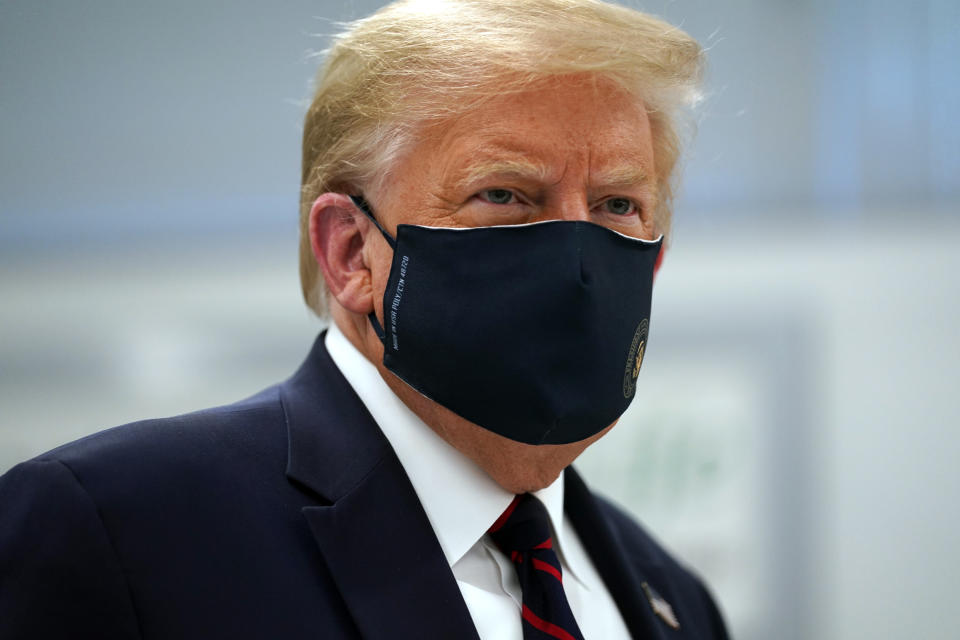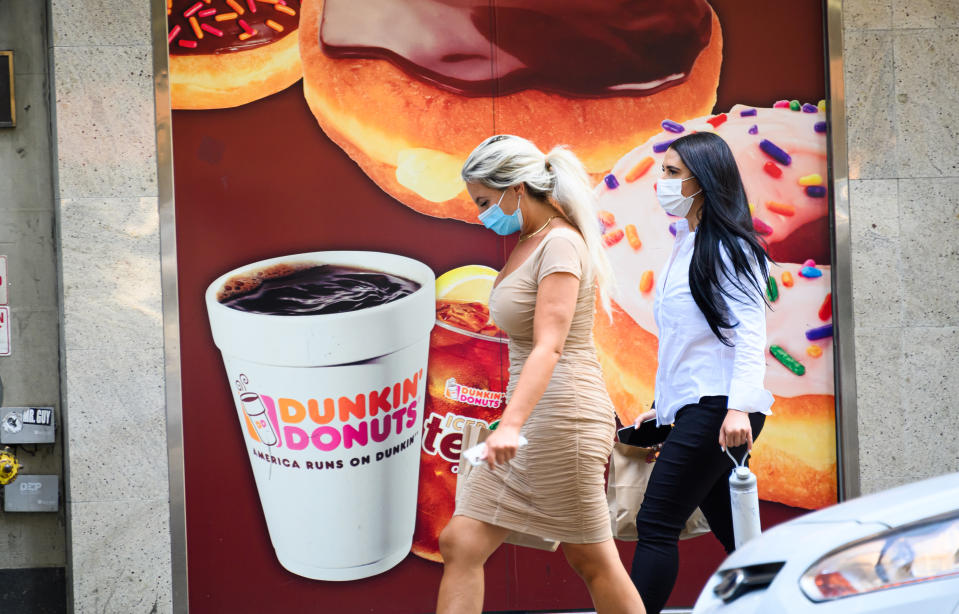Why some Americans say they'll never wear a mask — and what that says about the U.S.
While the vast majority of public health experts now agree that wearing face masks could halt the worsening coronavirus pandemic in its tracks, some Americans continue to resist that guidance.
More than two dozen states now have rules requiring residents to wear masks in stores and public areas. Big-box retailers like Target and Walmart have mandated that shoppers don a face covering to frequent their establishments. But the more that masks become embedded in everyday life, the more some people continue to push back. Fueled by mistrust of mainstream information, inconsistent messaging and concerns over the legality of mask mandates, there are some groups across the country that are organizing in protest of mask orders.
Broadcast on social media, confrontations over mask orders continue to erupt inside local businesses, with some turning violent.
“The majority of people seem to be following the recommendation, but research [shows] that there’s a small group of people who, when they feel like they’re being controlled, will respond by acting out,” Vaile Wright, senior director of Health Care Innovation at the American Psychological Association, told Yahoo News. “That might look like breaking the law or, in this case, not following medical recommendations.”
This behavior, Wright says, is influenced by a sense of distress and a lack of understanding of why the masks are necessary. It was also made worse by the fact that officials at the World Health Organization, in an effort to ensure that face masks went first to frontline health care workers, declared that masks were not recommended for everyone.
“You’ve got this huge sense of distrust of the government,” Wright said, “whether it’s local or federal. You’ve got distrust in the science. And then you have this really unfortunate situation where the science changed — science does that, especially in certain situations that are so novel and uncertain, but that’s really confusing for people.”
By a large margin, the U.S. has more confirmed COVID-19 cases (4.3 million) and deaths from it (nearly 150,000) than any other country, according to data from Johns Hopkins University. Yet for months, as the number of cases and the death toll have continued to rise, public health experts have issued more unified guidance that wearing a mask can help the country contain the pandemic.

Still, some Americans — like Kansas resident Daniel Dieker, who avoids wearing masks except at doctors’ offices — aren’t entirely convinced that masks work.
“I don’t think the masks are effective at all,” Dieker, 34, told Yahoo News via Facebook. He said he knows of only one person with a confirmed case of the coronavirus. That person had mild symptoms, Dieker said. “I’m not concerned about COVID-19 because everything I see adds up to inflated numbers and overhyped panic. I believe it’s no worse than a new influenza strain.”
Dieker didn’t identify specific sources for that view, and the Centers for Disease Control and Prevention says influenza and COVID-19 are caused by different viruses. Instead, Dieker pointed to what he described as misreported case numbers, inaccurate tests and mainstream news articles he believes are untrue.
“If I’m lied to several times,” he said, “why would I continue to believe the source of the lie, especially when the narrative doesn’t add up?”
Masks are also uncomfortable, Dieker said.
Dr. Steven Taylor, a psychiatrist at the University of British Columbia and the author of the 2019 book “The Psychology of Pandemics,” attributes the aversion to masks to several factors. Covering your face is not the norm in American culture, Taylor said, so it can be difficult for people to adjust to wearing one all the time. Also, he noted, some political leaders have taken the virus more seriously than others, sending mixed messages to the public.
President Trump, for instance, falsely said on Tuesday that large portions of the country are “corona-free,” and has vacillated between telling citizens to wear masks and sharing misinformation that downplays the importance of face coverings.
Rep. Louie Gohmert, R-Texas, tested positive for COVID-19 on Wednesday. Having often resisted wearing a mask, Gohmert said in an interview that he “can’t help but wonder” if wearing a mask and trying to keep it in place caused him to breathe in the virus.

This is not the first time Americans have resisted wearing masks during a public health crisis.
“In 1919 in San Francisco, there was an attempt by the authorities to make masks mandatory” during the so-called Spanish flu, Taylor said. “That caused the creation of the Anti-Mask League. The reasons they offered back then to not wearing masks are the same as the ones we’re seeing today. The people in the Anti-Mask League said, ‘We’re not going to wear masks because we don’t think they’re effective. And they’re an infringement on our civil liberties.’ So everything old is new again.”
The resistance to wearing masks may stem from America’s culture of individualism, which prioritizes personal freedom above practically everything else.
Michele Gelfand, a cross-cultural psychologist and professor at the University of Maryland, says the country’s response to the pandemic has much to do with what she calls its “loose” culture, compared with “tight” countries, such as Germany and Singapore, with a stricter adherence to social norms.
In a Boston Globe op-ed in March, Gelfand described U.S. culture’s “decentralized, defiant, do-it-your-own-way norms that make our country so entrepreneurial and creative and also deepen our danger during the coronavirus crisis.”
“It’s harder for people to accept when you have to become more strict,” Gelfand, the author of “Rule Makers, Rule Breakers: How Tight and Loose Cultures Wire Our World,” told Yahoo News.
Her article, published before the number of COVID-19 cases would skyrocket here, warned that the U.S. must “tighten up” to survive the coronavirus.
“I was trying to nudge the American public about the fact that our loose entrepreneurial spirit is really important and we don’t want to give that up,” she said, “but that under times of threat, we really need to start becoming more strict in terms of social rules in order to survive.”
For John Bruski, a 47-year-old pastor from St. Paul, Minn., the mask mandates and COVID-19 restrictions are about submission.
“It is a symbol of your silence,” he told Yahoo News via Facebook. “This whole thing has been about shutting down our voice. No gathering, essentially attacking churches, no family gatherings. Close the restaurants so you can’t gather. Close or control everything that has to do with our voices and relationships.”

Bruski said he believes the mandates are “wrong and unconstitutional,” a claim echoed by mask opponents and some attorneys general. But state laws generally give governors broad powers to make decisions in the interest of public health, despite whether residents believe them to be necessary.
“No one’s saying you have to believe that this is real,” Gerard Magliocca, a constitutional scholar and law professor at Indiana University, told Yahoo News. “You just have to wear a mask. I don’t think any court is going to say a mask requirement is invalid unless you go the route of saying, ‘There's nothing in state law that says that you can require people to wear masks at all.’”
Experts warn that the same issues surrounding mask compliance could create problems for promoting a vaccine.
“We know that vaccination nonadherence is already a big problem for seasonal influenza,” said Taylor, who has been conducting public surveys on the topic. “It’s going to be even worse for getting the vaccine against SARS-CoV-2. And that’s because it’s an unknown virus. The vaccine doesn’t have a track record yet. People are concerned about the safety and efficacy of a vaccine and worry that the whole process is being rushed. So that’s the next big challenge ahead.”
Dieker echoed those concerns, saying he would not get a vaccine until it was widely tested and approved for effectiveness and safety. “The rushed process makes it easier for issues to be missed,” he said. Bruski told Yahoo News he is not an “anti-vaxxer” but would not take the vaccine because he believes it’s “totally unnecessary” and probably wouldn’t work anyway.
“I think it’s the same psychological process that you see for masks,” Wright said. “Again, this sense of not wanting to feel controlled by others in what already feels like an uncontrollable situation.”
Public health experts have said that the way to effectively promote mask use is to offer consistent messaging that persuades, not forces, people to take precautions for themselves and their community.
“It’s really about depoliticizing masks in general,” Wright said, “and instead making the messaging about doing this as a way to protect your country, to protect you and to protect your community. And that as citizens, that comes with a certain amount of freedoms and price, but it also comes with responsibility. And in this case, that responsibility is to protect the public health.”
_____
Read more from Yahoo News:



